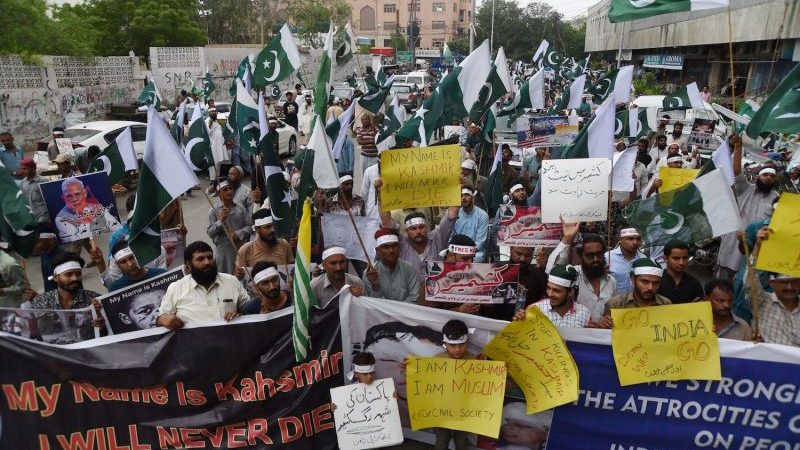India’s sudden Kashmir move could backfire badly

India has made a series of drastic, and in some cases unprecedented, moves in the disputed region of Jammu and Kashmir, which is administered by New Delhi but claimed by Pakistan.
On Aug. 2, the state government of Jammu and Kashmir issued an extraordinary order. Citing terrorist threats, it ordered tourists and pilgrims to evacuate, and it shuttered schools.
This came several days after New Delhi deployed thousands of new troops to the region. Then, on Aug. 4, officials in Kashmir cut off internet access and placed several prominent leaders under house arrest.
That was wildly disproportionate to any given threat of attack, especially in a region that’s faced terrorism before. Clearly, something bigger was at play. New Delhi was taking steps to head off potential unrest in a region with sizable levels of support for independence. Polls have found that as many as two thirds of the residents of the Kashmir valley want regional independence, though surveys find that support for independence tends to be weaker in Jammu.
The last time the government took such dramatic measures was in 2016, when Indian security forces killed Burhan Wani, a charismatic young militant revered by Kashmiris as a freedom fighter, and implemented a regionwide crackdown.
Sure enough, on Aug. 5, India announced that it plans to revoke Article 370, a constitutional clause dating back to 1949 that gives Jammu and Kashmir its special autonomous status. The scale of this move cannot be overstated. Abrogating Article 370 represents a major tipping point for an already fraught dispute—and it could easily backfire on India.
The Kashmir dispute goes back more than 70 years, to when India and Pakistan became free from British rule. After Partition in 1947, the leader of Kashmir could not decide whether to have his Muslim-majority region join India or Pakistan. After fighters entered Kashmir from Pakistan, Kashmir agreed to an accession treaty with New Delhi in return for India’s intervention to push back the Pakistani fighters. In 1948, the United Nations called for a plebiscite to occur after the region was demilitarized, in order to determine the future status of Kashmir. That never happened, however, and ever since then Kashmir’s status has remained unresolved. The region has also triggered multiple wars between India and Pakistan.
Article 370, however, enables Kashmir to craft and implement policies independently, with the exception of key spheres such as foreign affairs and defense. It also prevents outsiders from acquiring land in Kashmir. Article 35A, a separate constitutional clause also likely to be scrapped, strengthens Kashmir’s autonomous status by providing special rights and privileges to its permanent residents.
The ruling Bharatiya Janata Party (BJP)has frequently telegraphed its intention to ax Article 370, which is explicitly described by the constitution as a purely “temporary provision.”
The BJP has long viewed the region as an integral part of the nation and rejects the idea that Pakistan has any claim to the territory. By dispensing with the region’s autonomous status, it can formally consummate that integration and deliver a definitive blow to the region’s separatist impulses.
It can also better take advantage of investment and broader development opportunities for Kashmir. For these reasons, many Indians will celebrate the decision as a bold but necessary move.
Two recent developments probably pushed the government to act now. The first was U.S. President Donald Trump’s offer to mediate the Kashmir dispute.
The second is a rapidly progressing Afghanistan peace process, facilitated to an extent by Islamabad, which could lead to an eventual political settlement that gives the Taliban a prominent role in government.
Each of these developments strengthens Pakistan’s hand. Making a dramatic move on Kashmir enables New Delhi to push back against Islamabad. It also sends a strong message to Washington about New Delhi’s utter lack of interest in external mediation.
Domestic politics are also at play. A big-bang, early term move from the newly reelected BJP is sure to attract strong support from its rank and file, and such backing can blunt potential disillusionment and unhappiness down the road if the government struggles to ease India’s growing jobs crisis.
Indeed, it may not be a coincidence that the party, during its previous term, stepped up its Hindu nationalist policies—another surefire way to attract support from its base—after it struggled to carry out an oft-promised economic reform agenda.
But the repeal of Article 370 is fraught with risk. India is unilaterally altering the territorial status of a highly disputed territory that is, per square mile, the most militarized place in the world. Something has to give, and New Delhi understands this—which is why it implemented a draconian lockdown before the announcement.
For many Kashmiris, Article 370 had more symbolic than practical meaning, given that the long-standing and repressive presence of Indian security forces had undercut the notion of autonomy. Many Kashmiris face daily restrictions on their freedom of expression and movement, along with the constant risk of rough treatment from security personnel. Still, for many Kashmiri Muslims, the dominant group in Jammu and Kashmir and the victims of what they regard as an Indian occupation, the revocation of Article 370 is a nightmare scenario, because it brings them closer to an Indian state that they despise. Most of them want to be free of Indian rule.
Related News

TLP leader sentenced to over 35 years for threats against ex-CJP Isa
LAHORE: An Anti-Terrorism Court (ATC) in Lahore has sentenced banned Tehreek-e-Labbaik Pakistan (TLP) leader PirRead More

Govt pledges full support to Islamabad land survey affectees
ISLAMABAD, DEC 15 /DNA/ – The government has pledged its full support to address theRead More


Comments are Closed